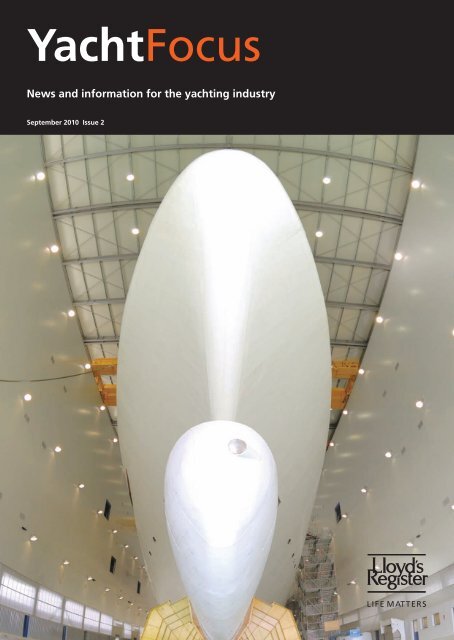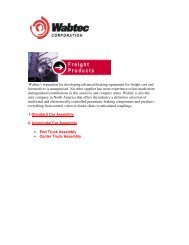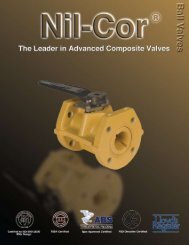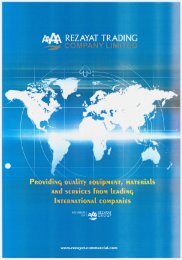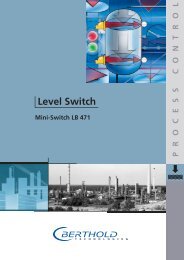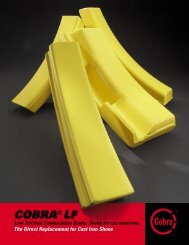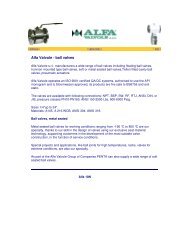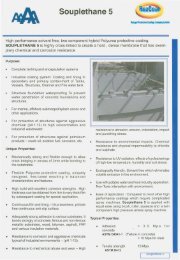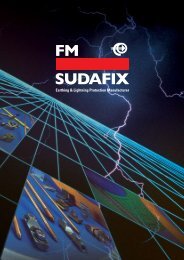Yacht Focus - Lloyd's Register
Yacht Focus - Lloyd's Register
Yacht Focus - Lloyd's Register
Create successful ePaper yourself
Turn your PDF publications into a flip-book with our unique Google optimized e-Paper software.
<strong>Yacht</strong><strong>Focus</strong><br />
News and information for the yachting industry<br />
September 2010 Issue 2
Cover image: Project 6154<br />
(Image courtesy of<br />
Fincantieri <strong>Yacht</strong>s.)<br />
Lloyd’s <strong>Register</strong> at 250 – past,<br />
Contents<br />
Lloyd’s <strong>Register</strong> at 250 2<br />
The Fincantieri experience 4<br />
Posidonia Cup 2010 6<br />
A global network 8<br />
Tomorrow’s yacht 10<br />
Our men at Oceanco 12<br />
A postcard from Italy 13<br />
<strong>Focus</strong> on legislation 14<br />
A look at the orderbook 16<br />
For further information on<br />
our yacht services, contact:<br />
Richard Goodwin<br />
Manager Passenger Ship<br />
Support Centre – New<br />
Construction, London<br />
T +44 (0)20 7423 2268<br />
E pssc@lr.org<br />
John Hicks<br />
Manager Passenger Ship<br />
Support Centre – Existing<br />
Ships, Florida<br />
T +1 (1)954 236 8366<br />
E miami-passenger-shipcenter@lr.org<br />
Managing Editor:<br />
Becky Walton<br />
T +44 (0)20 7423 2953<br />
E becky.walton@lr.org<br />
Designer:<br />
Dawn Smith – Pipeline Design<br />
T +44 (0)20 8316 4981<br />
E dawn@pipelinedesign.it<br />
<strong>Yacht</strong> <strong>Focus</strong> is produced by Marine<br />
Communications. Care is taken<br />
to ensure that the information it<br />
contains is accurate and up to date.<br />
However, Lloyd’s <strong>Register</strong> accepts no<br />
responsibility for inaccuracies in<br />
or changes to such information.<br />
<strong>Yacht</strong>s and Lloyd’s <strong>Register</strong><br />
Since the age of wooden boats, Lloyd’s <strong>Register</strong> has been an active part<br />
of the yachting industry.<br />
In 1878, we produced the first <strong>Register</strong> of<br />
<strong>Yacht</strong>s – the yachting equivalent of the<br />
<strong>Register</strong> of Ships – and we were the first<br />
classification society to introduce a set of<br />
rules and regulations exclusively tailored<br />
to yachts and special service craft.<br />
From the 107-year-old M/Y Madiz, the<br />
oldest surviving Lloyd’s <strong>Register</strong> classed<br />
steel yacht, to the most recent delivery<br />
of the biggest ever yacht, Eclipse, the story<br />
of Lloyd’s <strong>Register</strong> and the yacht industry<br />
has been one of continuous growth and<br />
development, with an increase in size<br />
and number of yachts on order and in<br />
service. Today, Lloyd’s <strong>Register</strong> remains<br />
the leading classification society in the<br />
yacht market.<br />
Maintaining quality<br />
We deliver innovative solutions in the<br />
harshest conditions, combining our<br />
global reach with deep local knowledge.<br />
We help to ensure that internationally<br />
recognised quality standards are<br />
maintained throughout the life of a vessel<br />
from construction to decommissioning,<br />
and carry out statutory inspections for<br />
national administrations, as required<br />
by international shipping Conventions<br />
and Codes.<br />
But we provide much more than<br />
traditional classification surveying<br />
services. There is an increasing need<br />
for the provision of sophisticated risk<br />
management and support to shipowners<br />
and ship managers to help them<br />
understand risks and improve business<br />
performance. Worldwide, Lloyd’s <strong>Register</strong><br />
provides management systems, fuel<br />
quality, environmental, vetting and training<br />
services to support our marine clients.<br />
In today’s environmentally conscious world<br />
there is increasing pressure to minimise<br />
the impact of yachts on the environment.<br />
We can help you control operational<br />
pollution and demonstrate a proactive<br />
approach to environmental protection. Our<br />
expertise covers environmental strategy<br />
and management, waste and ballast water<br />
management, ship recycling, noise and<br />
underwater pollution, greenhouse gas<br />
emissions reduction and the use of new<br />
and alternative fuels.<br />
Human element issues are also increasingly<br />
important in our complex world and we<br />
are leading the way in helping the industry<br />
make the most of its people.<br />
We participate in technical meetings<br />
of the International Association of<br />
Classification Societies (IACS), contribute<br />
to the development of Codes for national<br />
and international bodies such as the<br />
International Maritime Organization (IMO)<br />
and Red Ensign Group, and help to develop<br />
and review ISO (International Organisation<br />
for Standardisation) standards. We also<br />
function as a ‘notified body’ for many<br />
European Community directives, helping<br />
to ensure that essential product safety<br />
rules work properly, and we initiate new<br />
standards for quality and safety as the<br />
boundaries of knowledge expand.<br />
Remaining at the forefront of technology<br />
has always been a priority for Lloyd’s<br />
<strong>Register</strong> and we will continue to take a<br />
long term view of the developments and<br />
challenges facing the industry.<br />
New trends such as goal-based standards<br />
and alternative design arrangements which<br />
‘open the door’ to flexibility in design,<br />
2<br />
September 2010 <strong>Yacht</strong> <strong>Focus</strong>
present and future<br />
The mission and vision of the<br />
Lloyd’s <strong>Register</strong> Group is<br />
‘to secure for the benefit of the<br />
community high technical standards<br />
of design, manufacture, construction,<br />
maintenance, operation and<br />
performance for the purpose of<br />
enhancing the safety of life and<br />
property at sea, on land, and in<br />
the air and to advance public<br />
education within engineering<br />
and technological disciplines’.<br />
construction and operation of yachts, have<br />
seen the Lloyd’s <strong>Register</strong> Group invest<br />
heavily in both resources and knowledge.<br />
Looking ahead<br />
Doing more of what we do now and trying<br />
to do it better is our focus for the future.<br />
Shipowners, ship builders and regulators<br />
need class more than ever. The marine<br />
classification model has evolved over its<br />
250 years and the evolutionary process<br />
will continue. There will be an increased<br />
demand from those wishing to move well<br />
beyond compliance even as compliance<br />
grows more arduous – we need to ensure<br />
we are able to support those who just<br />
need to know they meet requirements and<br />
can trade freely, as well as operators who<br />
are using increasingly sophisticated risk<br />
management tools.<br />
Our role is to minimise risk while<br />
maximising opportunity for our clients.<br />
250 years of marine classification<br />
This year, Lloyd’s <strong>Register</strong> celebrates 250 years of marine classification<br />
and leadership in safety and environmental protection. From the age of<br />
sail, through the emergence of steam propulsion, iron and composite<br />
ships, and the diesel engine, to the sophistication and complexity of the<br />
latest ships, Lloyd’s <strong>Register</strong> has always provided independent assurance<br />
to the marine industry.<br />
The Lloyd’s <strong>Register</strong> Group owes its name<br />
and foundation to a 17 th century London<br />
coffee house owned by Edward Lloyd,<br />
which was a meeting place of merchants,<br />
marine underwriters and others connected<br />
with shipping. In 1760, customers of the<br />
coffee house formed the ‘<strong>Register</strong> Society’<br />
to examine merchant ships and ‘classify’<br />
them according to their condition. The first<br />
<strong>Register</strong> of Ships was printed in 1764. This<br />
<strong>Register</strong> is renowned today as a leading<br />
source of information on the world’s fleet.<br />
The early 1900s saw the Lloyd’s <strong>Register</strong><br />
Group bringing its expertise to other<br />
industries, particularly the energy sector.<br />
We also widened our services to include<br />
management systems certification.<br />
Today’s Lloyd’s <strong>Register</strong> has offices in 250<br />
locations worldwide and delivers services<br />
in 228 countries and territories. We have<br />
7,500 employees of 90 nationalities, 101<br />
companies and four business divisions:<br />
• Marine<br />
• Energy<br />
• Transportation<br />
• Management Systems (LRQA)<br />
Still sailing a century on<br />
LR<br />
number<br />
Vessel<br />
name<br />
Age<br />
Year of<br />
build<br />
Shipbuilder<br />
Country<br />
of build<br />
Overall length<br />
(metres)<br />
1006087 Marigold 118 1892 Camper & Nicholsons, Gosport United Kingdom 15.42<br />
8978356 Madiz 108 1902 Ailsa Shipbuilding Co., Troon United Kingdom 55.4<br />
1004778 Tuiga 101 1909 Fife United Kingdom 23.04<br />
1008748 Orion 100 1910 Camper & Nicholsons, Gosport United Kingdom 39.32<br />
26 of the yachts classed with Lloyd’s<br />
<strong>Register</strong> were built between 1892 and<br />
1960. Of these, four (listed above) are<br />
100 years old or more. They include Madiz<br />
(right), which was loving restored and<br />
re-classed X100A1 in 2006.<br />
September 2010 <strong>Yacht</strong> <strong>Focus</strong> 3
The Fincantieri experience<br />
There is no doubt that Italy is one of<br />
the leading countries within the yachting<br />
industry. However, the yachts delivered by Italian<br />
shipyards in recent years have typically been<br />
mega-yachts (those not exceeding 100 metres in overall<br />
length) while the best known giga-yachts have been<br />
built in Northern Europe.<br />
Image courtesy of Fincantieri <strong>Yacht</strong>s<br />
Fincantieri <strong>Yacht</strong>s, a division of Fincantieri, is closing this gap<br />
with ‘project 6154’, its new 134 metre yacht currently under<br />
construction in the company’s Muggiano Shipyard. She is<br />
scheduled to be delivered by the end of the year, and will fly<br />
the Cayman Islands flag.<br />
The new breed of ‘passenger yacht’<br />
This yacht is the first to be built by Fincantieri since re-entering the<br />
yacht business (during the 20th century, the company launched a<br />
number of yachts for the Italian Royal Family; the last one in 1952).<br />
Moreover, she is one of the first to be classed as a ’passenger ship’<br />
in accordance with Lloyd’s <strong>Register</strong>’s Rules and Regulations for<br />
the Classification of Ships and complies with SOLAS Convention<br />
requirements for a passenger ship carrying up to 36 passengers.<br />
In this respect, she can be considered as something rather different<br />
from a giga-yacht: a ‘passenger yacht’.<br />
“This ship constitutes a new experience for all the parties<br />
involved in the construction as we have all faced the challenge<br />
of reconciling typical luxury yacht finishing with the requirements<br />
of SOLAS,” says Mr Giovanni Romano, Managing Director of<br />
Fincantieri <strong>Yacht</strong>s. “This is particularly true for Fincantieri as it is<br />
our first yacht project.“<br />
The close collaboration between Fincantieri <strong>Yacht</strong>s, Lloyd’s <strong>Register</strong>,<br />
the Cayman Islands Shipping Registry and owner representatives<br />
throughout the design and build process has certainly been a key<br />
factor in the project’s success.<br />
Mr Romano adds: “Fincantieri <strong>Yacht</strong>s has created a team of young,<br />
motivated engineers and designers led by some of our more<br />
experienced colleagues at Fincantieri. These are the people who<br />
have established our company’s reputation for professionalism and<br />
the ‘quality first’ mentality which helps us save building time and<br />
costs and meet clients’ needs. We have also relied on consultants<br />
and contractors who are recognised as leaders in their field.<br />
Meanwhile, Lloyd’s <strong>Register</strong> has delivered valuable training courses<br />
to our people covering most of the technical aspects of yacht<br />
building, and we have trained our contractors on key aspects such<br />
as fire load and use of materials”.<br />
Meeting the challenges<br />
Fire load and finishing materials have in fact been two of the most<br />
challenging issues during the project, since working to ’passenger<br />
yacht’ standards dramatically reduces the quantity of wood and<br />
luxury finishing which can be employed, making it more difficult<br />
to satisfy interior designers’ requests and owner expectations.<br />
4<br />
September 2010 <strong>Yacht</strong> <strong>Focus</strong>
“This ship constitutes a<br />
new experience for all the<br />
parties involved in the<br />
construction as we have<br />
all faced the challenge of<br />
reconciling typical luxury<br />
yacht finishing with the<br />
requirements of SOLAS.”<br />
Mr Giovanni Romano, Managing<br />
Director, Fincantieri <strong>Yacht</strong>s<br />
But Fincantieri has overcome these challenges with a<br />
characteristically analytical approach. “SOLAS is in Fincantieri’s<br />
DNA” says Mr Pasquale Musella, Deputy Director. “Our team’s<br />
approach has helped us resolve the fire load and materials issues,<br />
together with many others which we have encountered in building<br />
this complex ship, and propose solutions which guarantee an<br />
equivalent level of safety.”<br />
He continues: “We have succeeded in adapting the building<br />
process to satisfy the needs and expectations of the yacht owner;<br />
needs which are usually completely different from those of a<br />
traditional shipowner. One of our strengths is our flexibility and<br />
this has helped us work with the owner’s team to achieve the<br />
unusual interpretation of aesthetics, finishing and symmetries<br />
required by the project.”<br />
Mr Mauro Parodi and Mr Stefano Saione, respectively Fincantieri<br />
<strong>Yacht</strong>s Project 6154 Manager and Technical Manager, agree that<br />
the team has experienced what they would call a ‘design for<br />
painting’ philosophy, where the design details are subordinated<br />
to fairing and painting and to interior designers’ needs. They<br />
comment: “At the beginning of the project, everybody talked<br />
of the vessel as if it were a yacht which had to comply with<br />
usual yacht standards such as the Large Commercial <strong>Yacht</strong> (LY2)<br />
Code and Lloyd’s <strong>Register</strong>’s Special Service Craft Rules. However,<br />
during construction we all became aware that we were actually<br />
building a passenger yacht and that many of the construction<br />
arrangements currently used on yachts were simply not acceptable<br />
on this vessel.”<br />
Deputy Director of Fincantieri <strong>Yacht</strong>s, Mr Pasquale Musella (left) and Managing<br />
Director, Mr Giovanni Romano (right). (Image courtesy of Fincantieri <strong>Yacht</strong>s.)<br />
The complexity of this project has been due not only to the<br />
difficulties of reconciling regulations with yacht finishing and<br />
owner expectations, but also to the many different characteristics<br />
of the vessel, such as the number of shell doors, a heli-deck with<br />
hangar facilities, a helicopter landing area, a huge sea water<br />
pool which may be used for tender docking, and a submarine for<br />
immersion up to 1000 metres, as well as other features covered by<br />
the confidentiality agreement. These have raised quite a number<br />
of issues which have been dealt with through close co-operation<br />
between Lloyd’s <strong>Register</strong> and all the parties involved in order to<br />
achieve the best result. Fincantieri <strong>Yacht</strong>s’ technical know-how,<br />
together with the company’s transparent and problem solving<br />
approach, has undoubtedly played a key role.<br />
Meanwhile, Fincantieri has signed another contract for a<br />
140-metre Passenger yacht. The company will certainly benefit<br />
from its experiences with project 6154 and the proposed<br />
13-36 Passenger <strong>Yacht</strong> Code (see the article on page 15) to<br />
which Fincantieri <strong>Yacht</strong>s has contributed as an active member<br />
of the Working Group.<br />
An artist’s impression of Project 6154 as she will look once completed.<br />
(Image courtesy of Fincantieri <strong>Yacht</strong>s.)<br />
For further information, contact: Paolo Izzo, <strong>Yacht</strong> Product<br />
Manager, Viareggio<br />
T +39 0584 969061<br />
E paolo.izzo@lr.org<br />
September 2010 <strong>Yacht</strong> <strong>Focus</strong> 5
The Posidonia Cup<br />
– five years old<br />
in 2010<br />
The <strong>Lloyd's</strong> <strong>Register</strong> team<br />
6<br />
September 2010 <strong>Yacht</strong> <strong>Focus</strong>
“The regatta coincided<br />
with another anniversary,<br />
the 250 th of its sponsor,<br />
Lloyd’s <strong>Register</strong>.”<br />
In late May, the Posidonia Cup celebrated its fifth<br />
anniversary, and was sponsored by Lloyd’s <strong>Register</strong><br />
yet again. Posidonia is probably the biggest and best<br />
known celebration of world shipping. The Cup is now<br />
Posidonia’s marquee event.<br />
The 2010 event certainly continued the success of previous<br />
years. In the words of the organisers: “The weather conditions<br />
were perfect, the wind blew and there was even a shower,<br />
creating the ideal conditions for the 56 yachts taking part in<br />
the 5 th anniversary Posidonia Cup on June 4, over the 2004<br />
Olympic sailing course.<br />
Now the flagship event of Posidonia, the cup attracted experienced<br />
sailors, senior executives, and some not so experienced seafarers<br />
from some of the best known names in shipping from around<br />
the world. Run over two legs, the regatta which coincided with<br />
another anniversary, the 250 th of its sponsor, Lloyd’s <strong>Register</strong>,<br />
provided the best opening for Posidonia 2010.”<br />
Chairman of Lloyd’s <strong>Register</strong>, David Moorhouse, speaking at the Cup<br />
press conference.<br />
Mr. John Maragoudakis (left), President of Cup organisers the Hellenic Offshore<br />
Racing Club, thanks Tom Boardley, Lloyd’s <strong>Register</strong> Marine Director, for our<br />
sponsorship of the event.<br />
“The cup attracted experienced<br />
sailors, senior executives, and<br />
some not so experienced seafarers<br />
from some of the best known<br />
names in shipping.”<br />
September 2010 <strong>Yacht</strong> <strong>Focus</strong> 7
Global reach, local support<br />
We have an international network of yacht support offices, underpinned<br />
by the specialist knowledge of our Passenger Ship Support Centres in<br />
London and Miami. This global reach gives us an unrivalled view of the<br />
market place and the technical developments shaping today’s yacht<br />
industry. It also ensures that, wherever you are, we will be nearby and<br />
able to apply a genuine understanding of local issues.<br />
NETHERLANDS (N)<br />
Rotterdam<br />
E rot-marine@lr.org<br />
T +31 (0) 10 4145088<br />
Offices also in: Amsterdam,<br />
Haren/Groningen and Vlissingen/Flushing<br />
Learn more about our<br />
global network – go to<br />
www.lr.org/yachts<br />
Key:<br />
N – New construction<br />
E – Existing yachts<br />
CANADA (N and E)<br />
Toronto<br />
E toronto@lr.org<br />
T +1(1) 905 631 9420<br />
Offices also in: Gatineau, Halifax, Montreal,<br />
New Brunswick (Saint John), Newfoundland<br />
(St.John’s), Quebec and Vancouver<br />
UNITED KINGDOM (N and E)<br />
London<br />
E pssc@lr.org<br />
T +44(0)20 7423 2489<br />
Southampton<br />
E southampton@lr.org<br />
T +44 (0)2380 525700<br />
USA (N and E)<br />
Miami<br />
E miami-passenger-ship-center@lr.org<br />
T +1 (1) 954 236 8366<br />
Seattle<br />
E seattle@lr.org<br />
T +1 (1) 425 440 0323<br />
Offices also in: Charleston, Chicago,<br />
Houston, Jacksonville, Los Angeles,<br />
Fort Lauderdale, New Orleans, New York/New Jersey,<br />
Norfolk, Philadelphia and Tampa<br />
The USA also covers The Bahamas, Bermuda and<br />
the Caribbean region.<br />
SPAIN (E)<br />
Barcelona<br />
E barcelona-marine@lr.org<br />
T +34 933 428 302<br />
Offices also in: Bilbao, Cadiz, Ferrol,<br />
Gijon, Las Palmas, Madrid, Palma de Mallorca,<br />
Vigo, Zaragoza and Lisbon (Portugal)<br />
FRANCE (E)<br />
Marseille<br />
E marseille@lr.org<br />
T +33 (0) 4 91 91 00 44<br />
Offices also in: Dunkirk, Le Havre,<br />
Lyon and Nantes<br />
BRAZIL (N and E)<br />
Rio de Janeiro<br />
E brazil-country-office@lr.org<br />
T +55 21 3523 0018<br />
Offices also in: Paranagua, Santos,<br />
Sao Paulo and Cartagena (Colombia)<br />
8<br />
September 2010 <strong>Yacht</strong> <strong>Focus</strong><br />
CHILE (N)<br />
Valparaiso<br />
E valparaiso@lr.org<br />
T +56 (0) 32 2217665<br />
Chile also covers Ecuador, Peru and<br />
the Falkland Islands<br />
MALTA (E)<br />
Valletta<br />
E valletta@lr.org<br />
T +356 21220683
DENMARK (N)<br />
Copenhagen<br />
E copenhagen@lr.org<br />
T +45 32 96 1800<br />
Denmark also covers the Faroe Islands, Finland,<br />
Greenland, Iceland, Norway and Sweden<br />
GERMANY (N)<br />
Hamburg<br />
E hamburg-marine-services@lr.org<br />
T +49 (0)40 328107 0<br />
Offices also in: Berlin, Bremen, Bremerhaven, Kiel<br />
and Rostock.<br />
Germany also covers the Central European Area<br />
including Estonia, Latvia and Lithuania<br />
RUSSIA (E)<br />
St.Petersburg<br />
E st-petersburg@lr.org<br />
T + 7 812 335 6977<br />
ITALY (N and E)<br />
Viareggio<br />
E viareggio@lr.org<br />
T +39 0584 969061<br />
Offices also in: Genoa, Marghera,<br />
Monfalcone, Naples, Palermo, Ravenna, Taranto,<br />
Trieste and Venice<br />
CROATIA (E)<br />
Rijeka<br />
E rijeka@lr.org<br />
T +385 51 336 608<br />
Offices also in: Pula, Split and Zagreb<br />
TURKEY (N)<br />
Istanbul<br />
E istanbul@lr.org<br />
T +90 (0) 216 368 9930<br />
SINGAPORE (N)<br />
Singapore<br />
E south-east-asia@lr.org<br />
T +65 6273 3424<br />
Singapore also covers Indonesia, Malaysia and<br />
Brunei, the Philippines, Thailand, Myanmar and<br />
Vietnam<br />
AUSTRALIA (N and E)<br />
Melbourne<br />
E melbourne-country-office@lr.org<br />
T +61 (0)3 98641600<br />
Offices also in: Brisbane, Cairns, Fremantle,<br />
Newcastle and Sydney.<br />
Australia also covers the Marshall Islands, Papua<br />
New Guinea, Solomon Island and Christmas Island<br />
SOUTH AFRICA (E)<br />
Durban<br />
E durban@lr.org<br />
T +27 (0) 31 305 4441<br />
Covers Southern Africa Area<br />
GREECE (N and E)<br />
Piraeus<br />
E piraeus@lr.org<br />
T +30 210 4580800<br />
UAE (N)<br />
Dubai<br />
E uae-marine-services@lr.org<br />
T +971 4 701 4190<br />
Covers the Middle East region<br />
EGYPT (E)<br />
Alexandria<br />
E alexandria@lr.org<br />
T +20 (0)3 480 5088<br />
Offices also in: Suez, Cairo and Port Said<br />
Egypt also covers Algeria, Dijbouti, Eritrea, Ethiopia,<br />
Lybia, Mauritania, Senegal, Somalia, Sudan and Tunisia<br />
NEW ZEALAND (N and E)<br />
Auckland<br />
E auckland@lr.org<br />
T +64 (0)9 373 3311<br />
New Zealand also covers American Samoa,<br />
the Cocos Islands, Fiji, French Polynesia, Kiribati,<br />
Samoa, Tahiti, Tokelau, Tonga, Tuvalu and Vanuatu<br />
September 2010 <strong>Yacht</strong> <strong>Focus</strong> 9
Tomorrow’s yacht<br />
As technology and legislation advance, the decisions facing<br />
yacht owners grow more complex. Here, we take a look at<br />
the issues and technologies which are influencing yacht<br />
design and operation, as well as how we can help you<br />
demonstrate compliance with forthcoming legislation.<br />
Materials<br />
Writing the Rules for composite materials<br />
Lloyd’s <strong>Register</strong> is continuously incorporating advances in<br />
engineering and materials science into improving standards for<br />
yacht design, construction and through-life maintenance. In recent<br />
years, construction techniques have evolved at a very fast rate, and<br />
composite materials have gained popularity as an alternative to<br />
metal. We have seen an increase in their use, not only in highperformance<br />
yachts that need to be lightweight, yet strong and<br />
stiff enough to take harsh loading conditions, but also in large<br />
motor yachts and ferries for which lower structural weight, integral<br />
thermal isolation and greater freedom of shape design are driving<br />
factors. Mega-yachts of 50 metres and above built entirely from<br />
composites are no longer a rarity.<br />
Lloyd’s <strong>Register</strong> EMEA and MARTEC*, part of the Lloyd’s <strong>Register</strong><br />
Group, are helping ensure these changes are reflected in the Lloyd’s<br />
<strong>Register</strong> Rules and Regulations for Special Service Craft, paying<br />
particular attention to requirements for craft built from fibrereinforced<br />
polymers of laminated construction and other composite<br />
materials. The changes to the Rules will be implemented gradually<br />
and will assist all parties involved in yacht construction. They take<br />
account of advances in sandwich skin construction and address<br />
issues such as how to optimise skin and core thicknesses for mono<br />
and multi-hull craft.<br />
For further information, contact:<br />
Claude DesRochers, Consultancy Manager, Martec Limited, Halifax<br />
T +1 902 425-5101 x260<br />
M +1 902 401 9848<br />
E claude.desrochers@lr.org<br />
or<br />
Ranko Petkovic, Ship Surveyor, Lloyd’s <strong>Register</strong> EMEA, Rotterdam<br />
T +31 10 22 48 527<br />
E ranko.petkovic@lr.org<br />
*MARTEC, an engineering firm based in Halifax, Nova Scotia, specialises<br />
in developing advanced engineering simulation technology for the design<br />
and analysis of complex structures and systems – particularly ships, ports,<br />
harbours, and offshore facilities. A pioneer in its field, Martec has delivered<br />
practical solutions to difficult engineering problems for over 30 years.<br />
Emissions<br />
A limit to emissions<br />
Air pollution from yachts, in terms of visible smoke and noise,<br />
has always been an issue for owners. Streams of black smoke or<br />
clattering engines were never the intention or part of the image.<br />
However, in addition to these self-imposed constraints, yachts<br />
sailing internationally must also comply with Annex VI of the<br />
MARPOL Convention, which covers the prevention of air pollution.<br />
This applies to ‘all ships’– there is no general exemption from the<br />
requirements as there is in the SOLAS Convention, for example, for<br />
‘pleasure yachts not engaged in trade’.<br />
MARPOL Annex VI covers a number of different air pollution issues,<br />
but the two principal ones are sulphur oxide (SO x<br />
) and nitrogen<br />
oxide (NO x<br />
) emissions. The Annex’s SO x<br />
requirements apply to all<br />
fuel oils used on board and have, to date, been met by limiting fuel<br />
sulphur content. This has not posed many problems since the gas<br />
oils used on yachts are normally, although not universally, below the<br />
Annex’s current lowest sulphur limit of 1.00%, in force in the North<br />
Sea and Baltic.<br />
The NO x<br />
requirements apply to all engines over 130 kW, other<br />
than emergency engines. Compliance is achieved by fitting, where<br />
required, an appropriately certified engine and retaining it in the<br />
‘as approved’ condition together with the associated approved<br />
documentation. The relevant level or ‘tier’ of NO x<br />
control is set<br />
according to the date of ‘ship’ construction or date of installation<br />
of an additional or non-identical replacement engine. This can pose<br />
definition problems for some yachts.<br />
However, there are a number of step changes already agreed in the<br />
Annex VI requirements, which will see more stringent SO x<br />
and NO x<br />
limits enter into force over the next decade. <strong>Yacht</strong> owners will need<br />
to be aware of these and take the necessary action ahead of time.<br />
For further information and advice, contact your local Lloyd’s<br />
<strong>Register</strong> Group office.<br />
10 September 2010 <strong>Yacht</strong> <strong>Focus</strong>
Propulsion<br />
The nuclear yacht – zero carbon leisure?<br />
A yacht that produces no CO 2<br />
could be considered very desirable in<br />
the prestigious super yacht market. Could nuclear power be<br />
a solution? Nuclear technology produces significant power with<br />
zero emissions.<br />
Environmental compliance<br />
EP notation: demonstrating green credentials<br />
EP notation (based on our Environmental Protection Rules) is a‘class<br />
notation’ that owners can use to demonstrate their environmental<br />
achievements. Already widely accepted by tanker and passenger<br />
ship operators, its benefits are now being recognised by other<br />
sectors. <strong>Yacht</strong>s, and especially mega-yachts, are leading this change.<br />
EP notation can be applied to new and existing vessels and has<br />
two elements: core requirements that broadly align with current<br />
environmental legislation, and optional supplementary characters<br />
which recognise early adoption of legislation and environmental<br />
performance in excess of current requirements. The supplementary<br />
characters of most relevance to mega-yacht operations include:<br />
B<br />
Biocide free antifouling<br />
G<br />
Enhanced grey water treatment<br />
I<br />
Approved Inventory of Hazardous Materials<br />
O<br />
Enhanced treatment of oily bilge water<br />
N1,2,3,e Reduced NO x<br />
emission limits<br />
P<br />
Enhanced tank protection<br />
R<br />
Use of refrigerants with low GWP100<br />
S<br />
Reduced SO x<br />
emission limits<br />
Sp<br />
Treatment of swimming pool water<br />
For further information, contact Natassa Kouvertari, Global EP<br />
Product Manager, Piraeus.<br />
T +30 210 4580859 E anastasia.kouvertari@lr.org<br />
Nuclear propulsion is a non-fossil fuel alternative currently<br />
being discussed for powering merchant vessels. It is not a new<br />
technology; there are 1000’s of years of accumulated experience<br />
in operating nuclear plant at sea. While the majority of this<br />
experience comes from the world’s navies, there are a number<br />
of smaller nuclear-powered merchant vessels operating today,<br />
including some which carry passengers. The Russian Arctic ice<br />
breakers, for example, operate as cruise ships in the arctic for<br />
a couple of months each year.<br />
In fact, the reactors used on these ice breakers have the right<br />
power output for a super yacht, so there is no technical reason<br />
why we shouldn’t have nuclear-powered yachts today.<br />
The principal global driver for adopting nuclear power is reduced CO 2<br />
emissions, but there are considerable challenges, generally related to<br />
perception, that would have to be overcome. It is interesting to note<br />
that, in the pursuit of CO 2<br />
reduction, land-based power generating<br />
stations globally are set to double in the next 20 years.<br />
The possible introduction of market-based measures (a cost<br />
levied on owners and operators per tonne of CO 2<br />
produced)<br />
will be a more likely route and could encourage the longer term<br />
development of alternative, more efficient, power sources.<br />
For further information, contact: Vince Jenkins, Global Marine Risk<br />
Advisor, London<br />
T +44 (0) 20 7423 2018<br />
E vince.jenkins@lr.org<br />
A Green Passport to compliance<br />
The Ship Recycling Convention was adopted to improve safety<br />
and reduce environmental pollution resulting from ship recycling.<br />
Though not yet in force, the Convention will require all ships above<br />
500 gt to have an Inventory of Hazardous Materials (IHM), also<br />
known as the Green Passport. This is essentially an inventory of<br />
materials in the vessel’s structure, systems and equipment that may<br />
be hazardous to health or the environment.<br />
Vessels under the 500 gt threshold, including yachts, will still be<br />
expected to demonstrate an equivalent level of compliance, and an<br />
IHM may also help to boost market reputation, something which<br />
can be important in an industry as sensitive as yachting. Lloyd’s<br />
<strong>Register</strong> provides an IHM (Green Passport) approval and verification<br />
service for yachts under construction and in service.<br />
For further information, contact Jim Heath, Green Passport Product<br />
Manager, London<br />
T +44 (0)20 7423 1530 E jim.heath@lr.org<br />
Biogas as fuel<br />
Lloyd’s <strong>Register</strong> is currently collaborating on a unique project to<br />
create a fleet of commercial coasters which will be powered by a<br />
combination of conventional soft sails and biogas marine engines.<br />
The biogas engines will supplement the sail power which can<br />
only provide 60% of the vessels’ propulsion in northern European<br />
wind conditions.<br />
While this is a commercial vessel project, the collaborators include<br />
leading yacht designers who are bringing their expertise to the hull<br />
and sail aspects.<br />
And the use of biogas as fuel could well be of wider interest to<br />
yacht designers and owners who wish to make their own vessels<br />
as environmentally friendly as possible.<br />
For further information, visit: http://www.b9shipping.com/<br />
September 2010 <strong>Yacht</strong> <strong>Focus</strong><br />
11
Our men at<br />
Oceanco<br />
Dutch company, Oceanco, is a<br />
leading designer and builder of<br />
luxury yachts with construction<br />
facilities in the Netherlands and<br />
a design and marketing office in<br />
Monaco. The company received<br />
a major accolade in 2008, when<br />
motor yacht Alfa Nero won seven<br />
awards. Oceanco’s Alblasserdam<br />
yard – Alblasserdam <strong>Yacht</strong>building<br />
B.V., near Rotterdam – is the<br />
permanent base of Lloyd’s <strong>Register</strong><br />
Surveyors, Willem Camping and<br />
Yuriy Mozhchil. The third member<br />
of the team Andries Koster is also<br />
based there for part of his time.<br />
Providing the best service to our clients<br />
relies on our specialist yacht knowledge.<br />
Willem, who has many years’ experience<br />
specifically in surveying passenger ships and<br />
more recently in surveying yachts, is passing<br />
on this knowledge to Yuriy and Andries,<br />
who have both joined him at Oceanco<br />
within the last two years.<br />
Yuriy says: “The Lloyd’s <strong>Register</strong> Special<br />
Service Craft Rules are applied to the<br />
design of these yachts, but at the<br />
construction stage what is quite specific<br />
and complicated is the extremely high level<br />
of quality control of the workmanship and<br />
outfitting.“<br />
Having our surveyors assigned full time<br />
to the yard is a testament to the strong<br />
relationship which we have established<br />
with Oceanco. Willem has been Account<br />
Manager for the company since 2006 and<br />
has overseen the delivery of a number of<br />
prestigious yachts, including Sunrays and<br />
Vibrant Curiosity, pictured below right.<br />
Together with Yuriy and Andries, he is<br />
currently surveying the construction of two<br />
new vessels (one 86 metres in length and<br />
one 87 metres) for delivery at the end of<br />
2010 and 2011 respectively, and the hull<br />
construction for another 86-metre yacht.<br />
Willem says: “We are very fortunate that<br />
Oceanco have allowed us to have a site<br />
office at the yard. I am involved with all<br />
newbuilds and prospective projects right<br />
from the design stage up to delivery.<br />
The yard recognises and appreciates my<br />
international experience in compliance of<br />
yachts with current regulations such as the<br />
LY2 Code and the SOLAS Convention, as<br />
well as the new ‘Passenger <strong>Yacht</strong> Code’<br />
which will come into force shortly (see<br />
the article on page 15). Supervising yacht<br />
construction is an exciting experience.“<br />
From left: Yuriy, Willem and Andries in their office at Oceanco’s Alblasserdam yard.<br />
Sunrays and Vibrant Curiosity, recent Oceanco deliveries.<br />
12 September 2010 <strong>Yacht</strong> <strong>Focus</strong>
A postcard from Italy:<br />
M/Y Family Day<br />
Willem (left) and Yuriy (right) survey one of the new<br />
mega-yachts under construction at Oceanco.<br />
Andries adds: “Oceanco builds complex<br />
yachts that demand flexibility from the<br />
surveyor. We have to find a balance<br />
between what the owner likes and what<br />
the regulations and rules allow. This is one<br />
of the aspects that make surveying these<br />
yachts so challenging.“<br />
M/Y Family Day is one of the latest yachts to be delivered by Cantieri<br />
Navali Ugo Codecasa Shipyard in Viareggio, Italy.<br />
The 65-metre vessel has been built to Lloyd’s <strong>Register</strong> and MCA rules and boasts Caterpillar<br />
engines and state-of-the-art navigation and communication equipment. Designed to be<br />
ocean-going, she is also fitted with Quantum anchor ‘zero speed’ stabilisers.<br />
For further information, contact<br />
Engel Jan de Boer, Manager Design<br />
Support Office, Rotterdam<br />
T +31 (0)10 2248539<br />
E engeljan.deboer@lr.org<br />
or Willem Camping, Senior Surveyor,<br />
Rotterdam.<br />
T +31 (0)10 4145088<br />
E willem.camping@lr.org<br />
A wealth of experience<br />
Willem trained as a Naval Architect in the<br />
Netherlands and joined Lloyd’s <strong>Register</strong><br />
in 1974. He has acquired extensive<br />
international experience through time<br />
spent in Brazil, Hong Kong, China, Korea,<br />
Singapore and Italy, where he was surveyor<br />
in charge at the Monfalcone site office for<br />
three years, and then surveyor in charge at<br />
the Naples office for five years.<br />
Yuriy trained at the Nikolayev Shipbuilding<br />
Institute in Ukraine, and worked as an<br />
engineer-designer and surveyor for the<br />
Russian Maritime <strong>Register</strong> of Shipping<br />
before joining Lloyd’s <strong>Register</strong> in 1992.<br />
He has worked in Russia, Ukraine and<br />
Lithuania.<br />
M/Y Family Day pictured in Portofino.<br />
Andries trained as a Naval Architect in the<br />
Netherlands and joined Lloyd’s <strong>Register</strong><br />
in 2007. After a period of plan approval<br />
activities he was assigned to the Oceanco<br />
site office under the guidance of Willem.<br />
M/Y Family Day (picture courtesy of Cantieri Navali Codecasa)<br />
September 2010 <strong>Yacht</strong> <strong>Focus</strong> 13
<strong>Focus</strong> on legislation<br />
Compliance and beyond: the Recreational<br />
Craft Directive<br />
For manufacturers, importers and owners of small<br />
craft, the Recreational Craft Directive is a critical<br />
piece of legislation. Before a yacht can be placed<br />
on the market or into service within the EU, it must<br />
comply with the Directive’s requirements for design,<br />
construction, components and exhaust and noise<br />
emissions.<br />
Certification of compliance with the Directive, when required, must<br />
be performed by a Notified Body. The Lloyd’s <strong>Register</strong> Group has its<br />
own Notified Body, LRQA GmbH, which is based within our <strong>Yacht</strong><br />
Services, Small Craft Department in Germany.<br />
A ‘Rodman 56’ motor boat.<br />
The craft is certified under the RCD by LRQA GmbH.<br />
The Recreational Craft Directive (RCD) sets standards for<br />
the design and construction of small craft (those between<br />
2.5 and 24 metres hull length) and their components and<br />
emissions. It aims to reduce trade restrictions and create<br />
standardised criteria for construction and importing.<br />
The Directive is made up of modules, based on design<br />
category. Builders and owners wishing to go beyond the<br />
basic requirements can opt to be assessed against additional<br />
voluntary modules. <strong>Yacht</strong>s conforming to the Directive<br />
must bear the CE mark.<br />
LRQA GmbH is headed by Rainer van de Stolpe, and supported<br />
globally by a network of specialist surveyors and auditors in<br />
our offices around the world. For Rainer, the work they do is<br />
something of a speciality within Lloyd’s <strong>Register</strong>. He comments:<br />
“All RCD requests, whether from Europe, Asia or the Americas,<br />
are co-ordinated by our department. It is a crucial aspect of the<br />
consistent support we provide to small craft builders and owners.<br />
Clients anywhere in the world can benefit from our centralised<br />
RCD expertise and from the support of a local surveyor who will<br />
carry out the inspection.”<br />
Going beyond basic compliance<br />
The extent of the service the team provides is determined<br />
by the assessment modules which the client chooses. Many<br />
manufacturers opt to go beyond the basic requirements of<br />
the Directive and select one of the more complex, voluntary<br />
assessment options. This can represent a marketing advantage in<br />
what is a very competitive sector.<br />
Certification against these ‘higher’ assessment modules means that<br />
clients are awarded the LRQA <strong>Yacht</strong> Service Mark, demonstrating<br />
their further commitment to quality and safety.<br />
For further information, contact Rainer van de Stolpe, or visit<br />
www.lrqa.com<br />
T +49 (0)421 1699514<br />
E rainer.vandestolpe@lr.org<br />
14 September 2010 <strong>Yacht</strong> <strong>Focus</strong>
Image courtesy of Fincantieri <strong>Yacht</strong>s<br />
Meeting the large yacht<br />
challenge: the ’13-36’ Code<br />
<strong>Yacht</strong>s are continuously increasing<br />
in size, but the majority of yacht<br />
Codes prescribe an upper limit<br />
of 12 passengers. Designing<br />
yachts over this limit presents<br />
the industry with a challenge,<br />
currently leaving the SOLAS<br />
Convention’s passenger ship<br />
requirements as the only option.<br />
To tackle this regulatory gap, the Red<br />
Ensign Group (REG) has set up a Working<br />
Group, chaired by the Cayman Islands, to<br />
prepare a draft Code of practice for yachts<br />
carrying between 13 and 36 passengers<br />
(but no more than 99 people in total)<br />
– the Passenger <strong>Yacht</strong> Code. Informally<br />
known as the 13-36 Code, this will apply<br />
to pleasure yachts of any size, in private<br />
use or engaged in trade, which do not<br />
carry cargo. The Code is currently in the<br />
latter stages of consultation and should<br />
be deposited by the United Kingdom<br />
at the IMO, the European Parliament<br />
and the Council of the European Union<br />
in the coming months as an equivalent<br />
provision under the SOLAS and Load Line<br />
Conventions and EU Directive 98/18/EC<br />
(now recast as 2009/45).<br />
The Code in practice<br />
As with existing yacht Codes, the standards<br />
incorporated in the 13-36 Code are largely<br />
based on the international Conventions<br />
which apply to commercial vessels, but<br />
they include equivalencies when it is<br />
not reasonable or practicable to comply<br />
with their requirements and if there is an<br />
opportunity to enhance safety.<br />
<strong>Yacht</strong>s which comply with the Code will<br />
be issued with the appropriate Passenger<br />
Certificate under the relevant International<br />
Convention or national law. In fact,<br />
ships to which the Code applies shall<br />
be designed, constructed, maintained<br />
<strong>Yacht</strong>s like Fincantieri’s Project 6154 (see page 4) may<br />
be built to the Passenger <strong>Yacht</strong> Code in the future.<br />
and assigned a ‘passenger ship’ class<br />
notation in compliance with the structural,<br />
mechanical and electrical requirements<br />
of a classification society recognised by<br />
the Administration. What is more, sailing<br />
vessels are provisionally excluded from the<br />
current version of the Code.<br />
A flexible approach<br />
The Code has a ‘stepped’ approach<br />
(see right – ‘The Code in detail’) which<br />
provides a margin of flexibility. In practice,<br />
this means that each category of yacht<br />
has defined standards of stability and<br />
survivability as regards scale of life-saving<br />
appliances and the maximum number<br />
of people carried. For example, if davitlaunched<br />
liferafts or marine evacuation<br />
systems are permitted in lieu of lifeboats,<br />
enhanced standards of subdivision, damage<br />
stability and fire protection are applied.<br />
Only ‘Passenger <strong>Yacht</strong> Unrestricted’ vessels<br />
over 80 metres in length carrying more<br />
than 50 persons are required to have<br />
lifeboats in accordance with SOLAS. In this<br />
way, the Code applies the philosophy of<br />
the ship being its own best survival craft.<br />
The Passenger <strong>Yacht</strong> Code differs significantly<br />
from the LY2 Code in some areas. Lloyd’s<br />
<strong>Register</strong> has been following its development<br />
since the consultation process began; we can<br />
provide advice and support on compliance,<br />
and its applications and implications.<br />
For further information, contact the<br />
Passenger Ship Support Centre in London:<br />
E pssc@lr.org<br />
T +44 (0)20 7423 2489<br />
The Code in detail<br />
The 13-36 Code identifies four<br />
‘passenger yacht’ categories<br />
according to their use (charter or<br />
pleasure) and intended area of<br />
operation:<br />
1. Pleasure Vessel not Engaged in<br />
Trade*<br />
2. Passenger <strong>Yacht</strong> Unrestricted<br />
(Engaged in Trade) (PY-U)*<br />
3. Passenger <strong>Yacht</strong> I (PY1)**<br />
4. Passenger <strong>Yacht</strong> II (PY2)***<br />
* Categories 1and 2 may operate in<br />
unlimited areas, though this does not<br />
include the Polar regions.<br />
** PY1 yachts are restricted to operate<br />
on a prescribed international voyage.<br />
This is a voyage during which the yacht<br />
is no more than 200 nautical miles from<br />
a port or place in which the passengers<br />
and crew could be placed in safety, and<br />
within a geographical area which limits<br />
the length of the voyage to a maximum<br />
of 1,000 nautical miles from the initial<br />
point of departure.<br />
***PY2 yachts may operate in an area<br />
within 60 nautical miles of a safe haven<br />
and no more than 20 nautical miles<br />
from land in weather conditions not<br />
exceeding wind force 6 and sea state 5<br />
on the Beaufort Scale.<br />
September 2010 <strong>Yacht</strong> <strong>Focus</strong><br />
15
A look at the orderbook<br />
Project 6154 (see page 4) is just one example of the yachts currently under construction to <strong>Lloyd's</strong> <strong>Register</strong><br />
class. The table below details some of the biggest yachts currently on order, as well as those delivered this year.<br />
Motor yachts<br />
LR number Vessel name Overall length<br />
(metres)<br />
Year of build Shipbuilder Country of build<br />
1009613 Eclipse 162.5 2010 Blohm + Voss Gmbh Germany<br />
9551454 Topaz 144 2012 Fr.Luerssen Werft Gmbh & Co. Germany<br />
1011850 Fincantieri 6218 140 2014 Fincantieri La Spezia Italy<br />
1010090 Fincantieri 6154 133.9 2010 Fincantieri La Spezia Italy<br />
1010222 Luna 114.2 2010 Stahlbau Nord Germany<br />
1010387 Devonport 055 96 2010 Appledore United Kingdom<br />
1010167 Palladium 94 2010 Blom + Voss Gmbh Germany<br />
1011331 De Vries Makkum 1004 88 2012 Slob Scheepswerf Papendre The Netherlands<br />
1010131 De Vries Makkum 1002 87.8 2010 Slob Scheepswerf Papendre The Netherlands<br />
1010753 De Vries Makkum 1003 87.8 2011 Slob Scheepswerf Papendre The Netherlands<br />
1011202 Oceanco Alblasserdam 707 87.01 2012 Zwijnenburg BV The Netherlands<br />
1011537 Rocky 86 2012 Kroeger Germany<br />
1009962 Cakewalk 85.6 2010 Derecktor USA United States of America<br />
1011757 Oceanco Alblasserdam 708 85.47 2012 Zwijnenburg BV The Netherlands<br />
1010777 Oceanco Alblasserdam 706 85.47 2010 Zwijnenburg BV The Netherlands<br />
1010351 Sunrays 85.43 2010 Zwijnenburg BV The Netherlands<br />
1010284 Phoenix2 85.2 2010 Kroeger Germany<br />
1010624 Firebird 85.1 2011 Kroeger Germany<br />
1011628 Bellissimo 85 2012 Kroeger Germany<br />
1011575 Niki 85 2013 Kroeger Germany<br />
1010739 Marco Chilena 231 82.6 2010 Astilleros Marco Chilena Chile<br />
1010727 Marco Chilena 230 82.6 2011 Astilleros Marco Chilena Chile<br />
Sailing yachts<br />
LR number Vessel name Overall<br />
length<br />
(metres)<br />
Year of build Shipbuilder Country of build<br />
1011147 Alloy <strong>Yacht</strong> 41 67.2 2010 Alloy New Zealand<br />
1010480 Kokomo 58.4 2010 Alloy New Zealand<br />
1010363 Royal Huisman 386 57.49 2010 Huisman Royal The Netherlands<br />
Lloyd’s <strong>Register</strong> EMEA<br />
T +44 (0)20 7709 9166<br />
F +44 (0)20 7423 2057<br />
E emea@lr.org<br />
71 Fenchurch Street<br />
London EC3M 4BS<br />
UK<br />
www.lr.org<br />
September 2010<br />
Lloyd’s <strong>Register</strong> Asia<br />
T +852 2287 9333<br />
F +852 2526 2921<br />
E asia@lr.org<br />
Suite 3501<br />
China Merchants Tower<br />
Shun Tak Centre<br />
168–200 Connaught Road Central<br />
Hong Kong, SAR of PRC<br />
Lloyd’s <strong>Register</strong> Americas, Inc.<br />
T +1 (1)281 675 3100<br />
F +1 (1)281 675 3139<br />
E americas@lr.org<br />
1401 Enclave Parkway<br />
Suite 200<br />
Houston<br />
Texas 77077<br />
USA<br />
Services are provided by members of the Lloyd’s <strong>Register</strong> Group.<br />
Lloyd’s <strong>Register</strong>, Lloyd’s <strong>Register</strong> EMEA and Lloyd’s <strong>Register</strong> Asia are exempt charities under the UK Charities Act 1993.


